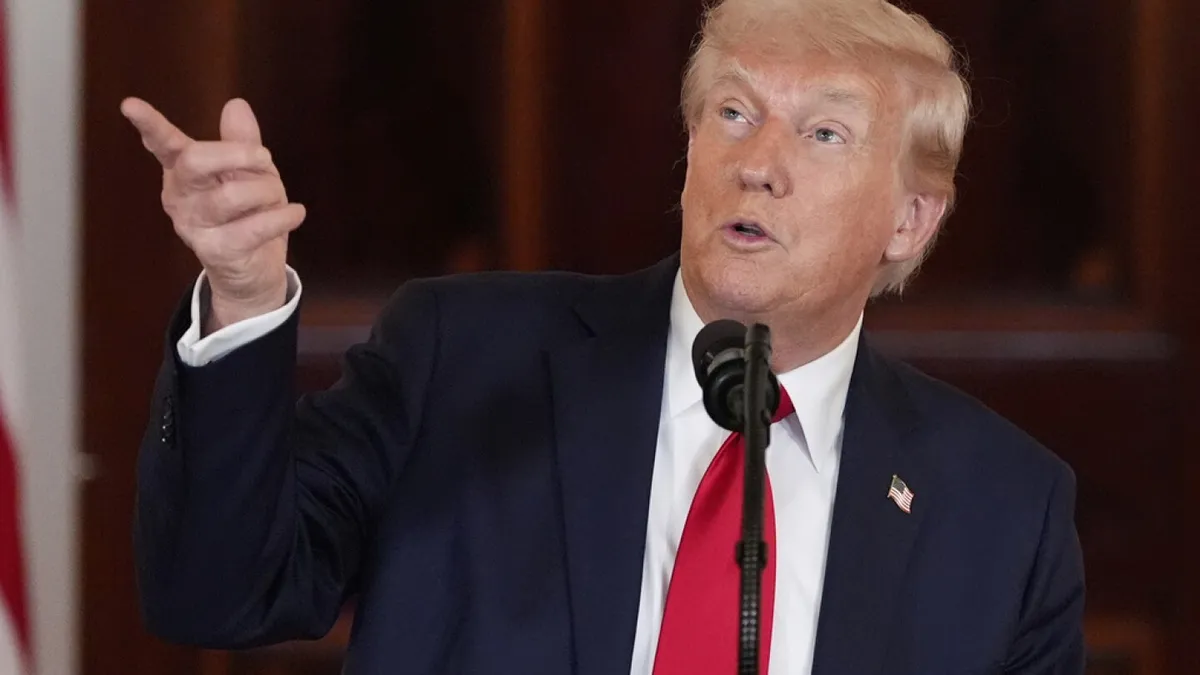
In a recent interview with Bret Baier on the Fox News Channel, Vice President JD Vance addressed the claims surrounding the departure of National Security Adviser Mike Waltz from the Trump administration. Vance emphasized that Waltz's new role as ambassador to the United Nations should be viewed as a promotion rather than a dismissal. “He’s being made ambassador to the United Nations, which, of course, is a Senate-confirmed position,” Vance stated, suggesting that Waltz's transition is a positive step in his career.
Vance further noted that Waltz was initially appointed to implement “serious reforms” at the National Security Council, a task he believes Waltz has accomplished effectively. “Now it’s time for Mike to do something else,” Vance remarked, indicating a strategic reshuffling within the administration.
In business news, Apple Inc. is adapting its manufacturing strategy to mitigate the effects of tariffs imposed during the Trump administration. CEO Tim Cook revealed that a significant portion of iPhones sold in the U.S. this fiscal quarter will be sourced from India, while devices such as iPads will come from Vietnam. This strategic move aims to shield Apple from the financial burdens associated with tariffs.
Despite challenges, Apple's earnings for the first quarter exceeded Wall Street expectations, driven by robust demand for iPhones. Cook noted that while the tariffs are expected to add approximately $900 million to the company's costs, he remains optimistic about Apple's overall business trajectory.
The Trump administration's legal strategies continue to face scrutiny as a federal judge expressed skepticism regarding a motion to transfer a deportation case involving a Georgetown University scholar from Virginia to Texas. The scholar, Badar Khan Suri, is currently jailed for allegedly “spreading Hamas propaganda.” U.S. District Judge Patricia Tolliver Giles raised concerns that moving the case could invalidate her previous order to keep Suri in the U.S. while his First Amendment case is evaluated.
Justice Department attorney David Byerley indicated that he would consult with U.S. Immigration and Customs Enforcement regarding the judge's concerns, although the judge remained cautious about relying solely on the assurances from ICE.
During a visit to Nucor Steel in Huger, South Carolina, Vice President JD Vance celebrated what he termed an “industrial renaissance,” attributing the revitalization of domestic industry to the policies of the Trump administration. This event was part of the administration's efforts to commemorate the first 100 days of Trump's presidency. Vance encouraged the workforce, stating, “I hope every single one of you feel a sense of pride, because these are the products that actually make America work.”
Nucor's leadership has shown strong support for Trump's tariff policies, which they believe have positively impacted their business model, even as these policies have sparked wider economic debates.
As President Trump prepared to address graduates at the University of Alabama, the political landscape remained charged. Despite Trump's significant support in the state, political figures like Beto O’Rourke highlighted the importance of grassroots opposition. “You cannot be too red or too rural or too Republican to be written off right now,” O’Rourke stated, referencing the state's rich history of civil rights activism.
Trump's appearance was expected to draw both supporters and protesters, showcasing the vibrant political discourse present in Alabama, a state where Trump has historically received overwhelming support.
In military news, the Army is undergoing a substantial transformation aimed at streamlining its operations. According to a memo from Defense Secretary Pete Hegseth, the initiative will involve merging or closing headquarters and eliminating outdated military equipment. This plan is part of a broader strategy to create a “leaner, more lethal force,” as the Pentagon faces pressure to reduce spending.
As many as 1,000 staff positions may be eliminated, including up to 40 general officer slots, reflecting the administration's commitment to optimizing military efficiency.
Amidst ongoing discussions about the impact of Trump's tariffs, economists warn of potential shortages and rising prices for American consumers. As businesses begin to cancel orders from China and reevaluate their expansion plans, experts predict that the ramifications of these tariffs will soon become evident in everyday life.
According to research director Judah Levine, consumers may start noticing shortages in categories heavily dependent on Chinese manufacturing, such as furniture and toys. The uncertainty surrounding trade policies is contributing to an economic environment marked by rising recession risks, as businesses and consumers alike brace for the implications of shifting tariffs.
In a notable legal action, three plaintiffs have filed a lawsuit in the Southern District of New York against the Trump administration, alleging the illegal dismantling of the National Endowment for the Humanities. This lawsuit claims that the administration's actions violate the Constitution, which grants Congress the authority to create federal agencies and control budget allocations.
The outcome of this case could have significant implications for the future of federal support for humanities programs across the country, especially following the recent cuts implemented by the Department of Government Efficiency.
The political landscape in the United States remains dynamic, with significant developments occurring across various sectors including national security, economics, and social justice. As the Trump administration continues to implement its policies, the effects will likely reverberate across the nation, shaping the discourse leading into future elections.